-
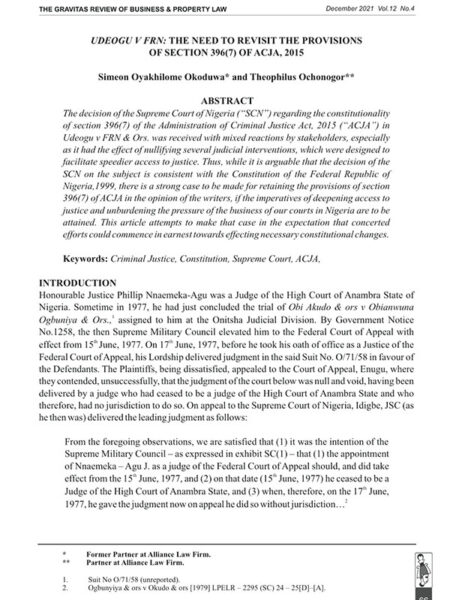
Udeogu v FRN: The Need to Revisit the Provisions of Section 396(7) of ACJA 2015
0₦2,500.00Simeon Okoduwa and Theophilus Ochonogor of the Alliance Law Firm, in their article, Udeogu v FRN: The Need to Revisit the Provisions of Section 396(7) of ACJA 2015, note that the decision of the Supreme Court which declared section 396(7) of ACJA, 2015 as inconsistent with the 1999 Constitution and therefore void needs to be revisited. The Section provides that a Judge of the High Court who has been elevated to the Court of Appeal shall have dispensation to continue to sit as a High Court Judge to conclude any part-heard criminal matter pending before him at the time of his elevation. Okoduwa and Ochonogor argue that if the imperatives of deepening access to justice and unburdening the pressure of the business of courts are to be attained, the Section needs to be retained.
-
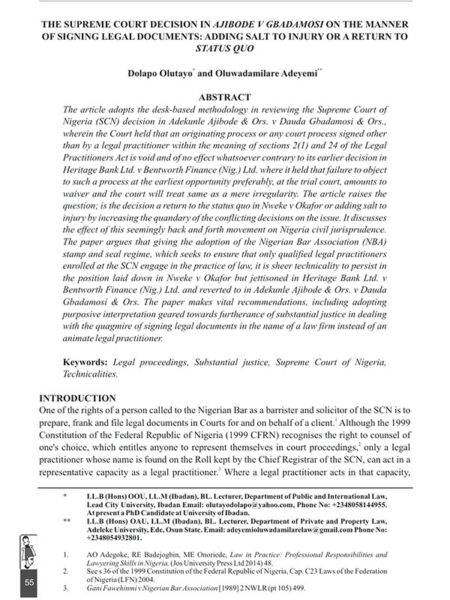
The Supreme Court Decision in Ajibode v Gbadamosi on the Manner of Signing Legal Documents: Adding Salt to Injury or a Return to Status Quo
0₦2,500.00Dolapo Olutayo of the Lead City University and Oluwadamilare Adeyemi of Adeleke University, in their article, The Supreme Court Decision in Ajibode v Gbadamosi on the Manner of Signing Legal Documents: Adding Salt to Injury or a Return to Status Quo, review the decision of the Supreme Court that an originating process or any court process signed other than by a legal practitioner is void and of no effect. The decision in Ajibode is contrary to the Supreme Court’s earlier decision in Heritage Bank v Bentworth where it held that failure to object to such a process at the earliest opportunity amounts to waiver, and the court will treat same as a mere irregularity. Olutayo and Adeyemi raise the question: is Ajibode a return to the status quo of Nweke v Okafor or only adds to the quandary of conflicting decisions on the issue?
-
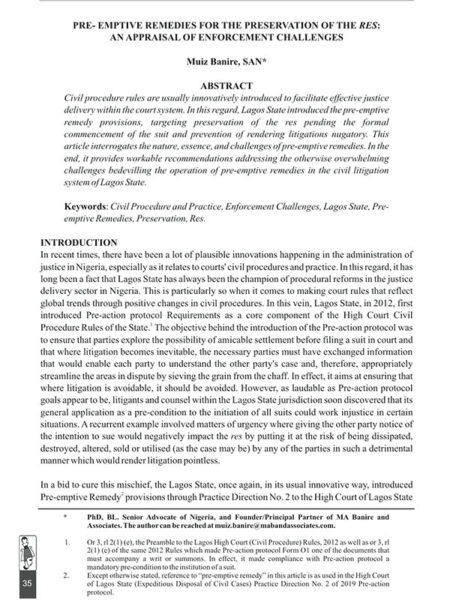
Pre-Emptive Remedies for the Preservation of the Res: An Appraisal of Enforcement Challenges
0₦2,500.00Dr Muiz Banire, SAN, Principal Partner of MA Banire and Associates, in his article, Pre-Emptive Remedies for the Preservation of the Res: An Appraisal of Enforcement Challenges, notes that the Lagos High Court (Civil Procedure) Rules 2012 introduced the pre-emptive remedy provisions, targeting preservation of the res pending the formal commencement of a suit and to prevent rendering litigations nugatory. Dr Banire interrogates the nature, essence, and challenges of pre-emptive remedies and provides workable recommendations addressing the challenges bedevilling the operation of pre-emptive remedies in the civil litigation system.
-
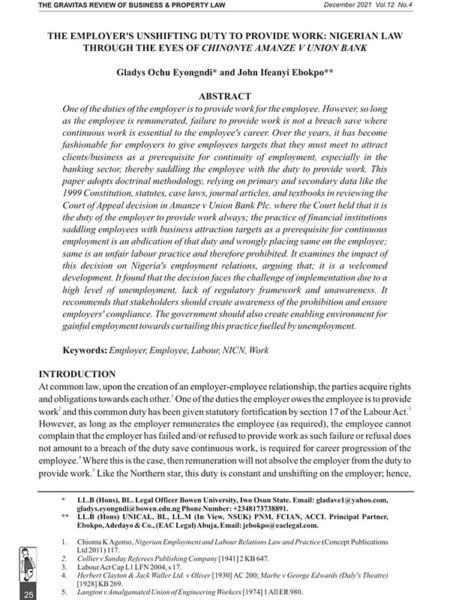
The Employer’s Unshifting Duty to Provide Work: Nigerian Law through the Eyes of Chinonye Amanze v Union Bank
0₦2,500.00Gladys Eyongndi, Legal Officer Bowen University, and John Ebokpo of EAC Legal, in their article, The Employer’s Unshifting Duty to Provide Work: Nigerian Law through the Eyes of Chinonye Amanze v Union Bank, laud the decision of the National Industrial Court that the employer has to provide work always. The practice of financial institutions saddling employees with deposit targets as a prerequisite for continued employment is an abdication of that duty, as the employee never has to go looking for work to sustain the business of the employer. Eyongndi and Ebokpo examine Nigerian law on an employer’s duty to provide work and the challenges facing employees in relation to the employer’s duty.
-
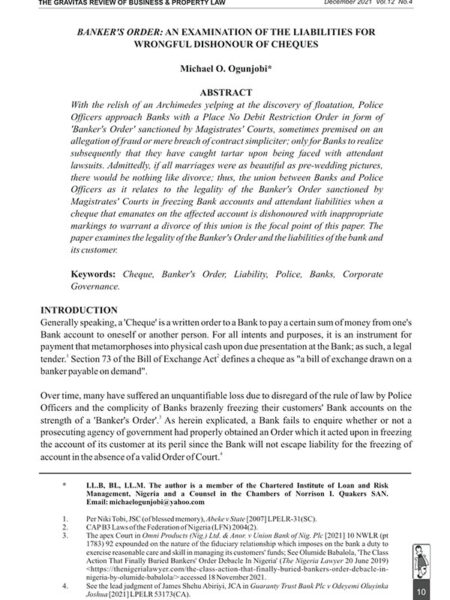
Banker’s Order: An Examination of the Liabilities for Wrongful Dishonour of Cheques
0₦2,500.00Michael Ogunjobi, of the Chambers of Norrison I. Quakers SAN, in his article, Banker’s Order: An Examination of the Liabilities for Wrongful Dishonour of Cheques, flays the practice by which Police Officers ‘freeze’ bank accounts acting on the so-called Banker’s Order’ issued by Magistrates. Ogunjobi examines the legality of the Banker’s Order, the bank’s customer’s liability for a dishonoured cheque and the reliefs the customer may pursue against the bank for a dishonoured cheque.
-
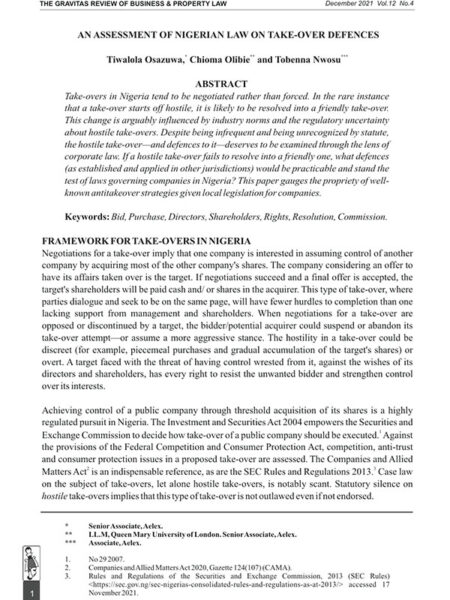
An Assessment of Nigerian Law on Take-Over Defences
0₦2,500.00Tiwalola Osazuwa, Chioma Olibie, and Tobenna Nwosu, all of Aelex in their article, An Assessment of Nigerian Law on Take-Over Defences, note that take-overs in Nigeria tend to be negotiated rather than forced. In the rare instance that a take-over starts off hostile, it is likely to be resolved into a friendly take-over. Though hostile take-over is unrecognised by statute in Nigeria, Osazuwa et al examine the framework for take-overs through the lens of corporate law. They consider take-over devices and defences and well-known anti-takeover strategies.
-
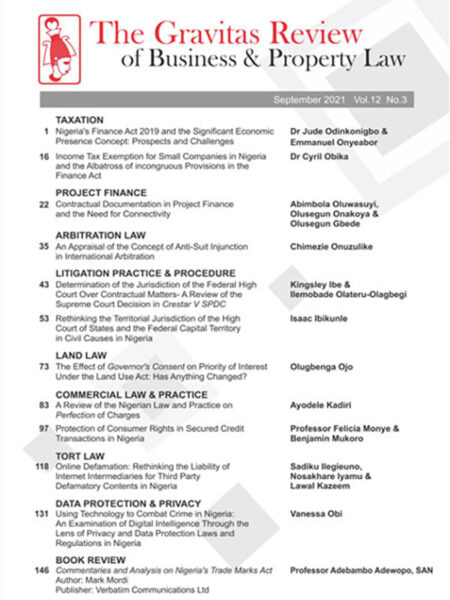
The Gravitas Review of Business & Property Law Vol.12 No.3 – Print
0₦5,000.00In this issue of The Gravitas Review of Business & Property Law Vol.12 No.3, there are well researched articles on:
- Taxation
- Project Finance
- Arbitration Law
- Litigation Practice & Procedure
- Land Law
- Commercial Law & Practice
- Tort Law
- Data Protection & Privacy
- Book Review
-

The Gravitas Review of Business & Property Law Vol.12 No.3 – E-Book
0₦5,000.00In this issue of The Gravitas Review of Business & Property Law Vol.12 No.3, there are well researched articles on:
- Taxation
- Project Finance
- Arbitration Law
- Litigation Practice & Procedure
- Land Law
- Commercial Law & Practice
- Tort Law
- Data Protection & Privacy
- Book Review
-

The Gravitas Review of Business & Property Law Vol.12 No.3
0₦5,000.00In this issue of The Gravitas Review of Business & Property Law Vol.12 No.3, there are well researched articles on:
- Taxation
- Project Finance
- Arbitration Law
- Litigation Practice & Procedure
- Land Law
- Commercial Law & Practice
- Tort Law
- Data Protection & Privacy
- Book Review
-
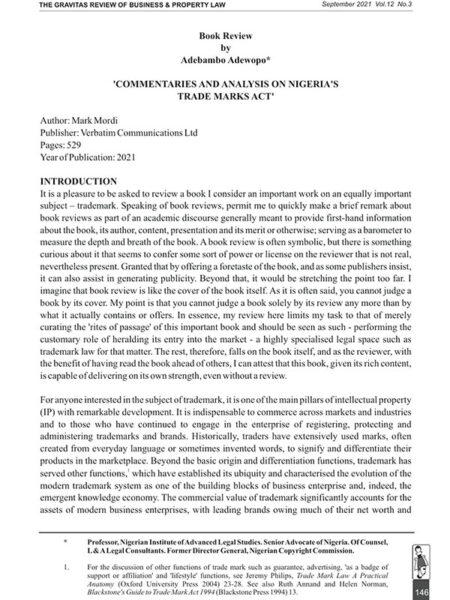
Commentaries and Analysis on Nigeria’s Trade Marks Act
0₦2,500.00Professor Adebambo Adewopo SAN, of the Nigerian Institute of Advanced Legal Studies, and former Director-General, Nigerian Copyright Commission in his brilliant review of Mark Mordi’s new book titled ‘Commentaries and Analysis on Nigeria’s Trade Marks Act’, highlights that the book, a practitioner’s companion, effectively combines the qualitative, quantitative, analytical and conceptual research models to explore the Trade Marks Act landscape.
-
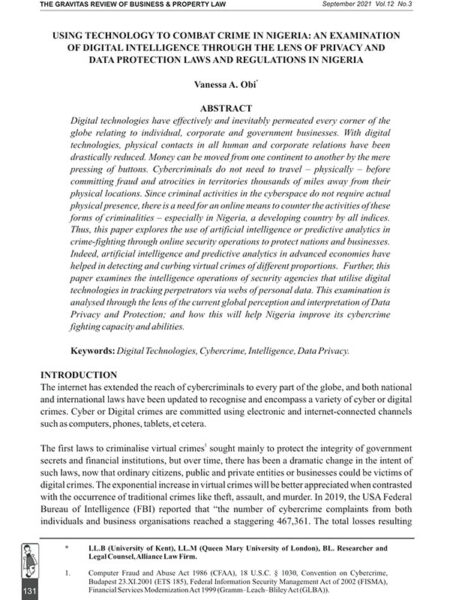
Using Technology to Combat Crime in Nigeria: An Examination of Digital Intelligence Through the Lens of Privacy and Data Protection
0₦2,500.00Vanessa Obi, Researcher and Counsel at the Alliance Law Firm, in her article, Using Technology to Combat Crime in Nigeria: An Examination of Digital Intelligence Through the Lens of Privacy and Data Protection, explores the use of artificial intelligence or predictive analytics in crime-fighting through online security operations to protect nations and businesses. Vanessa examines the intelligence operations of security agencies that utilise digital technologies in tracking perpetrators via webs of personal data. She examines these through the lens of data privacy and protection laws; and how this will help Nigeria improve its cybercrime fighting capacity and abilities.
-
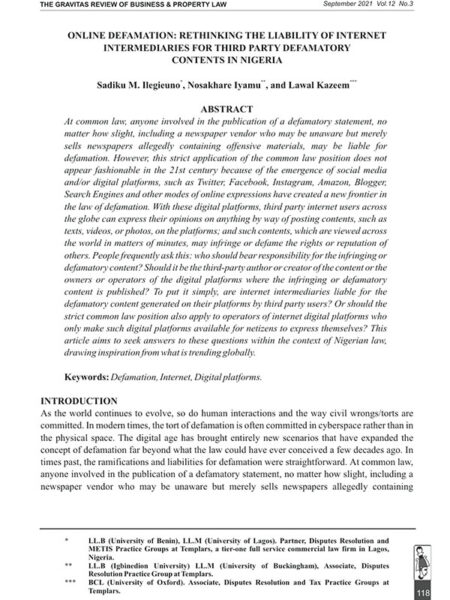
Online Defamation: Rethinking the Liability of Internet Intermediaries for Third-Party Defamatory Contents in Nigeria
0₦2,500.00Sadiku Ilegieuno, Nosakhare Iyamu, and Lawal Kazeem, Partner and Associates respectively at Templars, in their article, Online Defamation: Rethinking the Liability of Internet Intermediaries for Third-Party Defamatory Contents in Nigeria, note that the emergence of digital media has created a whole new category to the original definition of defamation, and the strict definition of the tort at common law has been rendered otiose in application to new media. Sadiku et al examine who bears the liability for defamatory content since several parties are often involved in the publication. Should it be the third-party author or creator of the content or the owners or operators of the digital platforms where the infringing or defamatory content is published? In other words, are internet intermediaries liable for the defamatory content generated on their platforms by third party users? They examine these questions within the context of the common law, the extant laws in Nigeria, and what is obtainable across the globe.
The Gravitas Review of Business & Property Law



